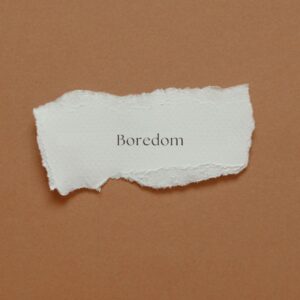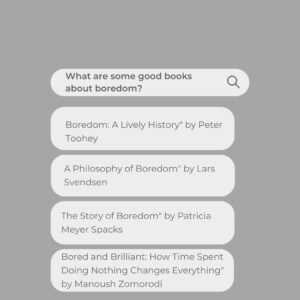
Boredom is a complex experience that plays a significant role in our lives. While it can be uncomfortable, it also drives creativity, self-reflection, and personal growth. Understanding boredom from psychological, philosophical, scientific, and neuroscientific perspectives helps us appreciate its nuances and harness its potential for positive change.
Let’s learn about boredom together today.
What is Boredom?
Boredom: a feeling of disinterest and restlessness, seeking something more engaging.
The History of Boredom
The concept of boredom, as we understand it today, is relatively modern. The term “boredom” first appeared in the English language in the 19th century. Before this, people used words like “ennui” and “tedium” to describe similar feelings. Ennui, derived from French, conveyed a sense of weariness and dissatisfaction that was often associated with the aristocracy and their perceived lack of purpose.
During the Industrial Revolution, the rise of repetitive, monotonous work led to a new awareness of boredom among the working class. The rapid changes in society, the regimented work schedules, and the increasing separation between work and leisure time all contributed to the emergence of boredom as a distinct emotional state.
What Famous People Say About Boredom
Friedrich Nietzsche:- The philosopher viewed boredom as a necessary condition for creating value and meaning in life. He suggested that enduring boredom could lead to self-discovery and personal growth.
Bertrand Russell: The British philosopher and logician argued that boredom is essential for a happy life, as it can lead to reflection and creativity. He believed that a life without boredom would be superficial and unfulfilled.
David Foster Wallace: The acclaimed writer highlighted boredom in his works, often exploring how it affects modern society. In his famous commencement speech “This is Water,” he discussed the struggle against the banality of everyday life and the importance of awareness and mindfulness.

I haven’t read any of them, but if you need, I’ve given you a few names, and you’ll find the rest with a little online research
Boredom: Perspectives from Psychology, Philosophy, Science, and Neuroscience
Psychology:- Boredom is an emotional state that happens when we don’t find meaning or excitement in what we’re doing. It can be caused by both boring tasks and our own lack of interest or motivation.
Philosophy: – Philosophers have long discussed boredom’s meaning and importance. Some, like Sartre and Heidegger, believe boredom shows life’s emptiness, encouraging people to reflect on their existence and seek genuine experiences. In short, boredom can inspire self-reflection and personal growth.
Neuroscience: : Boredom activates the brain’s “default mode”, which is responsible for daydreaming and self-reflection. This can actually boost creativity and problem-solving skills. In short, boredom can be a chance for your brain to think creatively!
Conclusion
Boredom is a complex and multifaceted phenomenon that offers opportunities for self-reflection, growth, and creativity, despite its uncomfortable and often frustrating nature.
Find some interesting stuff. “Bore early and bore often.“
Let’s find answers to some questions now
Why Do We Feel Boredom?
Psychology:- It’s a brain signal that we need something more interesting or challenging, often due to repetition, lack of challenge, or a skills mismatch.
Philosophy: – Philosophers see boredom as a natural part of life.Boredom forces us to confront our life’s purpose and find authentic activities.
Neuroscience: Boredom triggers the brain’s default mode network (DMN), sparking daydreaming and self-reflection. This can help us find more engaging thoughts or activities.
Is Boredom Bad?
Psychology:- Philosophers believe boredom can be a catalyst for self-improvement.
Philosophy: – Philosophers see boredom as a natural part of life.Boredom forces us to confront our life’s purpose and find authentic activities.
Neuroscience: Boredom helps the brain conserve energy and reset. It allows the brain to rest and become more open to new information and experiences. However, too much boredom can disrupt mental processes and emotional balance.
Can Boredom Be Good for Creativity?
Psychology:- Boredom can boost creativity by allowing our minds to wander and explore new ideas. This state, called “mind-wandering,” can lead to creative insights and problem-solving.
Philosophy: – Philosophers can’t say anything in one word but i say yes!!
Neuroscience: During boredom, the brain’s default mode network (DMN) becomes more active, which is linked to imagination and daydreaming. This helps make unexpected connections and generate new ideas.
End
I have only explored natural boredom and discussed it. While researching, I came across a lot of information about chronic conditions, but I am not an expert, and I don’t think I am the right person to discuss medical terms on a blog. I hope you found the concept of boredom interesting, and if you benefit from this article in any way, that’s a bonus.
Thank you (if anyone is reading this)